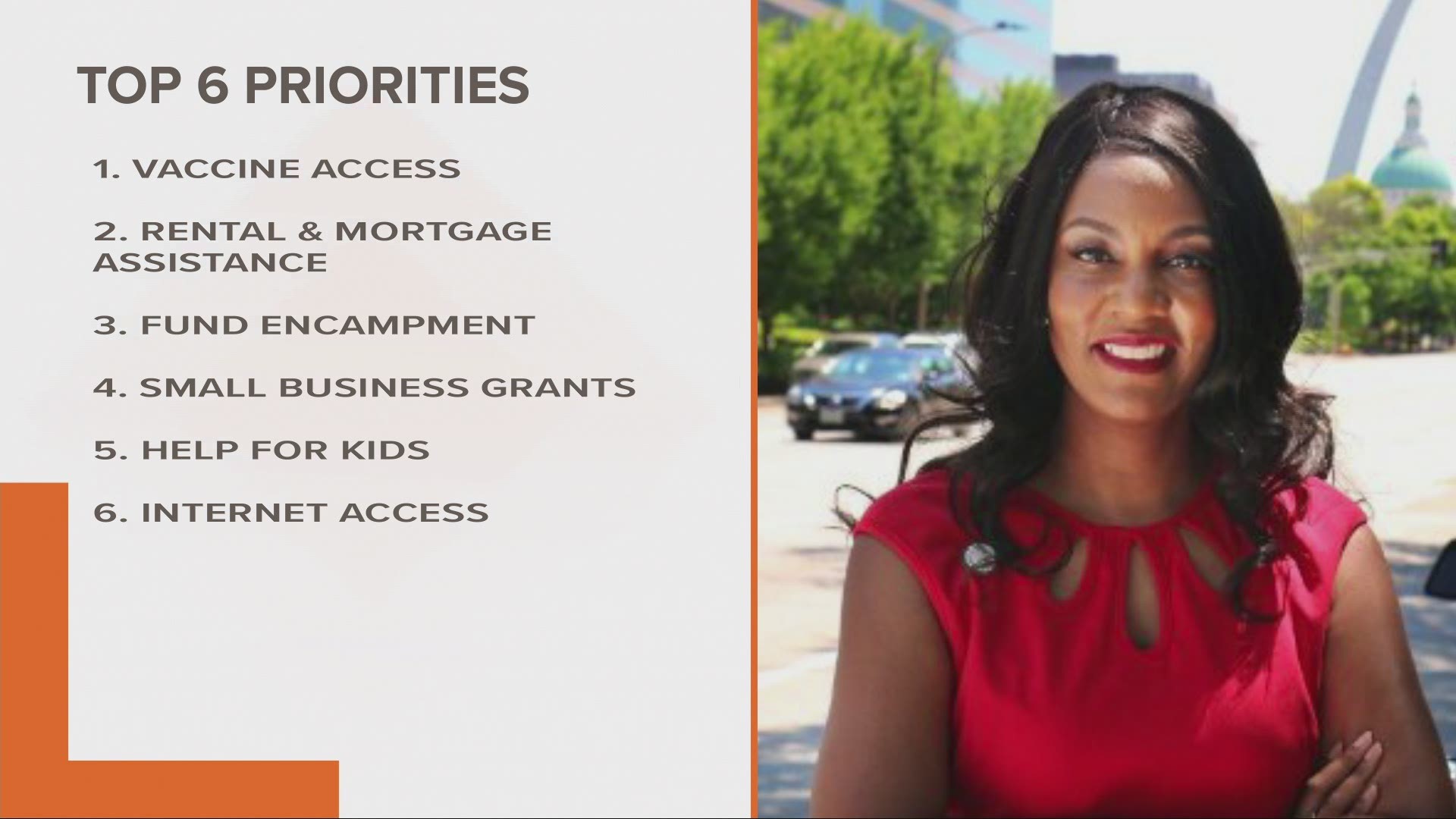ST. LOUIS — A $250 million infusion of federal money landed in St. Louis on Friday. As part of the American Rescue Plan Act, the city expects to receive a total of $517 million in a little over a year. This week, Mayor Tishaura Jones announced the city’s priorities and a basic plan for part of that money.
The recommendation memo, created by the Stimulus Advisory Board’s Direct Relief subcommittee and with input from the public, lays out how $68 million in funds from three federal programs would be spent on six community needs.
“Nationwide, as well as in St. Louis, African Americans, black and brown people have been affected by the coronavirus more than any other ethnicity, so we're making sure we're using these funds to help these people that have been most affected,” Jones said.
The largest chunk of funds, $17.9 million, is planned to go into housing assistance. The money is divided between rental, mortgage, and real estate property tax assistance, as well as legal assistance and mediation intended to respond to the wave of evictions expected when city circuit courts lift current eviction moratoriums.
Mayor Jones gave presented an updated plan on June 15, you can watch her full news conference detailing the funding priorities in the YouTube video below:
“The eviction moratorium is not going to last forever. And when that eviction moratorium does run out, we could be faced with a whole ‘nother level of homelessness that we have not yet seen,” said Alderwoman Megan Green, Ward 15.
Green helped craft the plan as part of the Stimulus Advisory Board.
Responding to news that the state of Missouri would no longer be accepting federal enhancement funds to give to people on unemployment, the recommendations include funding to provide payments between $350 and $500 to the people who would have qualified for that money.
“We felt like it's a pretty abrupt stop for benefits for a lot of folks in our community. And the labor market still has not rebounded completely from the pandemic. And if we can provide support for an estimated 10,000 people in our city trying to get back on their feet, we should do that,” said Green.
Those payments are part of the category to receive the second-largest amount of money, $14.5 million intended to provide Economic Relief.
Close to $10 million will go toward “Critical Health Needs,” which include COVID-19 testing and vaccination. The most money in the category goes to behavioral health providers.
“Probably most of the people who have the access and the ability to get to [mass vaccination] events have probably gotten into those events. So we need to shift and we need to shift to doing smaller site vaccination events where we can get into neighborhoods, particularly lower-income neighborhoods, with folks that don't have as easy of access to transit or access to information to know where these mass vaccination events have taken place so that we can get more people within our community vaccinated,” said Green.
Expanded access to the internet will get a $6 million boost under the recommendations, increasing the accessibility of devices through the St. Louis Public Library and adding WiFi access points to public parks and community centers.
Nearly $5 million will go towards youth jobs and education programs, including $3 million for year-round and summer jobs through St. Louis Public Schools and the St. Louis Agency on Training and Employment.
The second-largest sum of money will go to the Unhoused Neighbors priority group, funding shelters, encampments, and case management assistance.
“Folks recognize the status quo has not been working in our city and that we need to take a more compassioned, data-driven approach to addressing homelessness in our community,” said Green.
Mayor Jones says community input will be key to deciding where the rest of the ARPA money goes. The recommendations discuss using the future money to address “systems-level interventions including…a guarantee income and/or premium pay for essential workers program, a universal child care program, expanded public transit options, and increasing the capacity of affordable housing to address critical infrastructure needs and service gaps.”
The distribution of money focuses on six top priorities, the mayor’s office said.
- Priority 1, Critical Health Needs $9,650,000: Begin mobile vaccination efforts, community canvassing and more to increase vaccine access in low-income communities
- Priority 2, Housing Assistance $17,891,997: Expand and expedite rental and mortgage assistance efforts, including legal assistance
- Priority 3, Support for Unhoused Neighbors $13,086,370: Fund an intentional encampment for those not ready for a shelter environment as well as a 24-hour shelter
- Priority 4, Economic Relief $14,500,000: Facilitate small business grants, provide startups and small businesses ready to scale with technical assistance and workforce development
- Priority 5, Youth Jobs & Programming $4,620,750: Expand youth programming at recreation centers, adding social workers to recreation centers to address the behavioral and mental health needs of young people in St. Louis and making recreation centers vaccine hubs for youth
- Priority 6, Expanding Internet Access $6,000,000: Install Public wifi points in portions of the city with lowest rates of internet access, partnership with St. Louis Public Libraries (SLPL) to increase access to phones, tablets, routers and mobile hotspots.
- Administrative Costs: $2,350,000
Read the complete plan and list of recommendations on the city’s website here.
Mayor Jones’ administration said the plan was developed with the help of the Stimulus Advisory Board and more than 2,500 city residents.
The city is looking to quickly begin putting the funds to use, but before the plan is finalized the public is invited to share feedback during a Stimulus Advisory Board meeting this Thursday, June 3 at 5:30 p.m. Click here to register and get more information.

